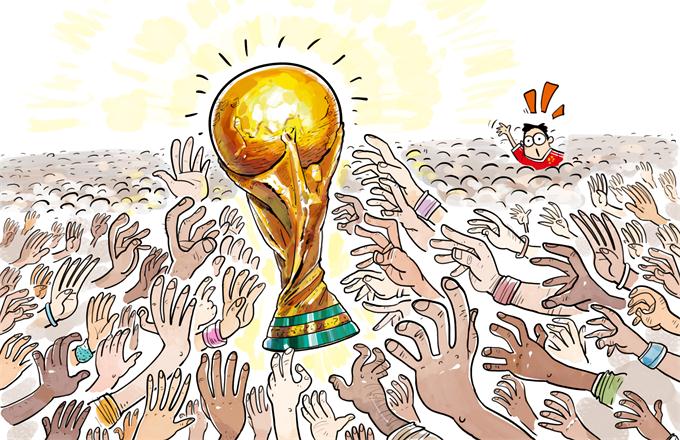Building a better world
The foundation for the solidarity of the BRICS members is their common aspiration for a more equitable world order
Because the growth of the BRICS members has slowed and they are all facing different development bottlenecks as a result of the external economic environment and volatile capital flows, some Western analysts have concluded that the leverage of BRICS has been overhyped and it should be replaced by CIVETS (Columbia, Indonesia, Vietnam, Egypt, Turkey and South Africa) or Next-11 (Pakistan, Egypt, Indonesia, Iran, South Korea, Philippines, Mexico, Bangladesh, Nigeria, Turkey and Vietnam).
However, an unbiased look at BRICS ahead of the fifth BRICS Summit in Durban, South Africa, this month - which will conclude the first round of summits - will show that the significance of BRICS lies not just in the economic cooperation of its members. The grouping has now gone far beyond its original investment concept and evolved into an independent platform for collaboration and coordination among the world's leading emerging economies.
A country's economic growth rate is not equivalent to its economic influence. China, Russia, India, Brazil and South Africa, each being of great regional and even international influence, account for almost 30 percent of the world's landmass, 40 percent of the world's population, 20 percent of the global economic output and 35 percent of global foreign exchange reserves. The leverage of BRICS lies in not just the fast growth of its members, it also lies in the huge potential of their massive domestic markets in a globalized world. This potential is incomparable with any other grouping of emerging economies.
The slowing of the BRICS countries' economic growth must be viewed in the context of the global economy's sluggish recovery from the global financial crisis and the eurozone debt crisis. It's true that the lackluster performance of the BRICS members in 2012 was disappointing, but their average growth rate was 3.84 percent, almost triple the 1.3 percent of advanced economies. What's more, given the industrialization and urbanization processes under way, the growth momentum of the BRICS economies will remain strong as long as their domestic problems are handled properly.
BRICS has already achieved many tangible results besides the moralistic bombast of its summit declarations. So far, an agreement has been signed that allows for credit in local currencies when BRICS members trade among themselves - a challenge to the dollar hegemony. A joint commitment to fund the International Monetary Fund's global firewall against the eurozone's debt crisis has been made in exchange for completion of the IMF quota reform and a bigger say in the IMF and World Bank. And a BRICS development bank with an initial capital injection of $50 billion will take shape this year, which will help finance infrastructure and sustainable development projects in the BRICS countries and other developing countries.
It's true that the BRICS failed to unite behind a single candidate for either the IMF or the World Bank when their top positions came open, but it is unreasonable to expect the 5-year-old BRICS to be as mature as the G7, which has been active in the international arena since 1975.
The foundation for the solidarity of the BRICS members is their common aspiration for a more equitable world economic order, one that accommodates the concerns of emerging economies. Despite their cultural and political differences, the BRICS members are all middle-income countries at a similar stage of industrialization and modernization. They all need a benign and stable external environment to advance their domestic economic and social development. From this perspective, BRICS is clearly not just an economic grouping, it is a united attempt by the five leading developing nations to promote an economic governing structure that reflects the changed realities of the global economy in the 21st century.
Gradually incorporating emerging economies into the international economic governance structure is in the interests of the developed economies as well. In an interdependent world classical game theory no longer applies and the developed economies will have to accommodate the rise of BRICS on the international stage in the face of shared global challenges.
The author is with the Chinese People's Institute of Foreign Affairs.
(China Daily 03/20/2013 page8)




















